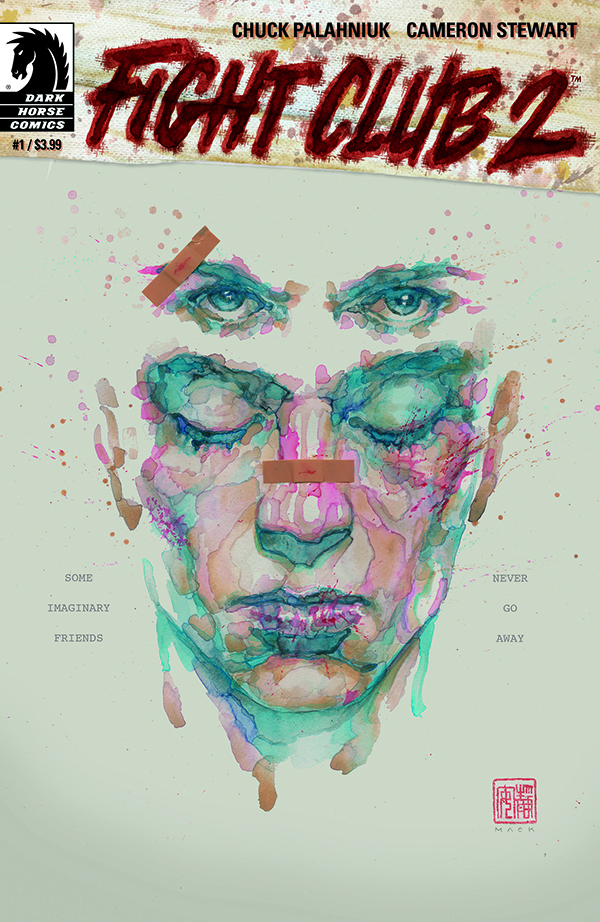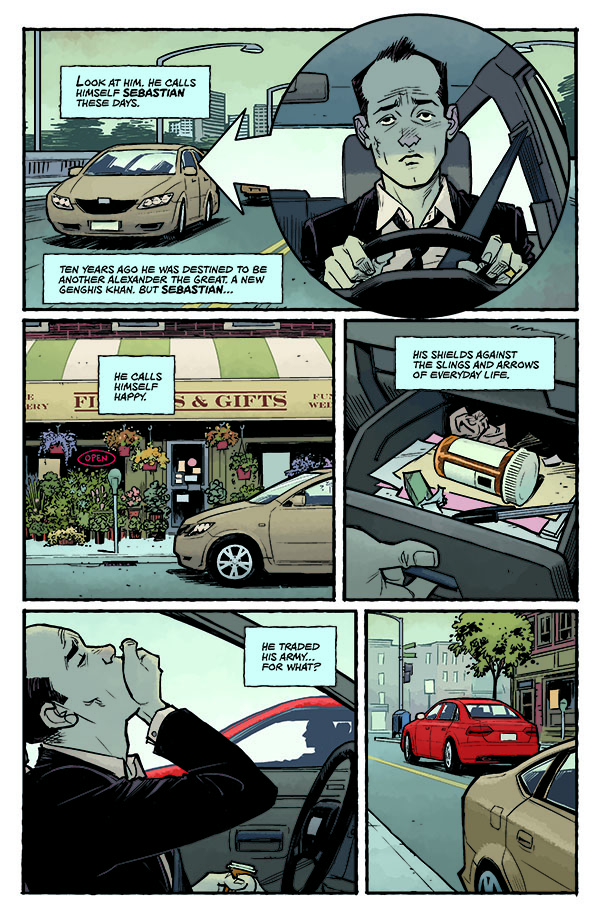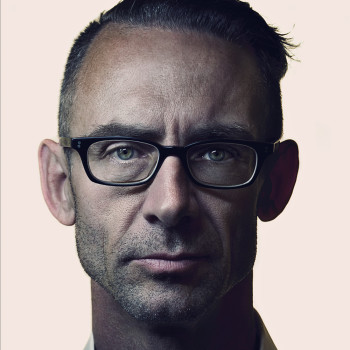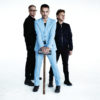Chuck Palahniuk has written a slew of best-selling books, the most notorious of which is still probably his first — “Fight Club.” It’s about a timid white-collar worker who, along with the charismatic Tyler Durden, helps break other men out of their dull consumerist lives… by forming a club where they beat each other up. The club later morphs into “Project Mayhem,” a kind of neo-terrorist group.
In the late ’90s, both the book and movie adaptation of “Fight Club” were huge cult hits, and Chuck just started serializing a sequel in comic book form. It’s appropriately called “Fight Club 2.” And its publication was a great excuse to ask him to hold forth on one of his favorite topics — pranks.

Rico Gagliano: So, those unfamiliar with your background might wonder why we are talking to you, of all people, about pranks. Would you please explain the connection between pranks and “Fight Club?”
Chuck Palahniuk: A lot of “Fight Club,” especially the second part of the book, was based on the Cacophony Society, which was a group of people based in San Francisco, Portland, Seattle, Los Angeles, who organized enormous pranks and spectacles — to entertain themselves and to kind of shock the world around them.

Rico Gagliano: And you participated, yes?
Chuck Palahniuk: I did, yes.
Rico Gagliano: For how long? Or can you —
Chuck Palahniuk: You’re never really out of it. And so many of the things are costumed — like the “Santa Rampage,” where you have 2,000 people all answering to the name “Santa Claus” and are all dressed as Santa Claus — that there’s always a possibility I am still one of those 2,000. [Ed. note: Check out Rico’s Marketplace report on L.A.’s 2005 Santa Rampage here.]
Rico Gagliano: Does any one prank stand out for you?
Chuck Palahniuk: My favorite one was probably “Le Art Mall.” Every city has kind of a pretentious gallery district, and one night a month, all the new shows open. Here in Portland, it’s the first Thursday of every month. And the Cacophony Society found one gallery that was going belly up, and got the use of that gallery for their very last first Thursday… and stocked it with the most profane, inane, worthless art that we could find in thrift stores, and got the worst mimes, and served the worst red wine. And then we huckstered all of these art mavens to come to our gallery as part of our big art event.
Rico Gagliano: Was the reaction one of shock? Or kind of like, “Hmm, well, this has importance.”
Chuck Palahniuk: It was that kind of Andy Warhol undecidability where they’re not really sure whether they’re being put on or not. And they weren’t going to leave until they decided. And so eventually everyone was in our gallery. We would set them horrible tasks. Everyone would be given a very strange word that they had to use four times in conversation. I remember one woman trying to use the word “phallocentric” over and over before she could leave.

Rico Gagliano: But here’s the thing: in satire they say there’s an object of attack — that high-quality satire is attacking something worthy of being attacked. What was the object of attack there? Art-goers who think they know what they’re talking about? Or galleries that feed on them?
Chuck Palahniuk: It was more to do with the scene itself, where people would pretend to be interested in art, but really they were just trying to get laid with other people who were pretending to be interested in art. And to kind of sucker those people in, and to have them sort of work their scene in a place that had nothing to do with real art.
Rico Gagliano: What to you is the importance of this kind of pranking? Is it more than just watching people freak out?
Chuck Palahniuk: On another level it was about this permission to be a very large, public person — to be that mime that was grabbing people off the street and bringing them into the gallery. And it was a way of serving people, by providing them with a spectacle. With an experience that they would go home and talk about for the rest of their lives.
Rico Gagliano: Why was that important to you, though?
Chuck Palahniuk: It’s like giving them a gift. To sort of create an unexplainable thing that is not just readily dismissed. That people have to discuss with other people in order to assimilate as part of their experience.
Rico Gagliano: That’s interesting that you would think of it as a gift, because I think when people think of pranks, they think of someone being the victim of a prank.
Chuck Palahniuk: My favorite Cacophony events couldn’t be construed as victimizing anyone. There were kind of more mean-spirited things. For instance, they would crucify this gigantic Easter bunny outside the front of the Albina Baptist Church on Easter morning —
Rico Gagliano: Oh, no!
Chuck Palahniuk: — And they would hold a huge passion play around this crucified bunny as parishioners were coming and going. And that’s not something that I took part in, because I couldn’t get into that. Especially on a day that was very important to them.
Rico Gagliano: Have you ever actually found yourself caught up in a prank that you did not initiate?
Chuck Palahniuk: The very first one. I saw a flyer for something called “Voodoo Weddings.” It was going to be held at an ancient Tiki bar here in Portland, and they were going to hold this tropical musical festival, and they were going to marry people in these “voodoo wedding ceremonies.” And I got there early and I staked out a table with my friends. And then all of these very trendy… again, these very hip, slick, Jordache-jeans people, showed up and kind of took over the whole scene.
But during the high point of the voodoo weddings, the nerdy, geeky, Cacophony people started to throw raw chicken guts into the crowd as part of the “Voodoo Wedding.” And it was the opposite of the movie “Carrie.” Instead of the cool kids dumping viscera on the dweeb kid, it was the dweeb kid throwing viscera on all the cool kids — including me.
And I was so thrilled and so impressed that these people had fooled me. And that my drink was ruined, and that I was spattered with blood and that everyone around me was screaming. And I just had to be part of this group.
Rico Gagliano: There’s an interesting concept that others have brought up, which is that when you are pranked — or when you witness somebody being pranked — you kind of see the world in a different way. Very often pranks are taking something that you’re familiar with and suddenly twisting it. It sorts of shocks you out of complacency.
Chuck Palahniuk: Right. Sort of subverting an expectation in the moment. One of the most basic things that I love to do is to take my dog to an off leash park, I have a little Boston terrier. And I will take this very realistic severed hand that has a bone sticking out of the wrist, and it’s covered in blood —
Rico Gagliano: Fake blood, I’m assuming.
Chuck Palahniuk: — Yes, please. And my dog is trained to fetch this thing, and the reaction on people’s faces as they see this adorable dog run by with a gory hand in its mouth is priceless.
Rico Gagliano:I know that you have done a lot of research about pranks. What is your favorite prank from all time?
Chuck Palahniuk: The wonderful pranks are the ones that have been kind of adapted into media. For years the Cacophony Society would dress as these giant salmon, and they would swim upstream during the San Francisco Bay To Breakers run.
Rico Gagliano: For those who don’t know, this is in San Francisco where people dress in costume and run down to the bay, right?
Chuck Palahniuk: Right, and running against this huge flood of people would be these giant salmon, that would be leaping and try to make their way in the opposite direction. And the wonderful thing about that is that it’s been co-opted as a Nike advertising campaign, and Nike now pays people to dress as salmon and run against the tide. And so if you do a fantastic prank, it does get co-opted by the mainstream culture and it lives forever.
Rico Gagliano: That’s interesting that you’d find that good, though. I mean it seems like such a punky, outsidery thing to do to pull pranks. You’re swimming against the tide, and then the mainstream tide co-opts you. Isn’t that a bad thing? What’s the gain of that?
Chuck Palahniuk: That you got to write the rules. You got to make the game up, and everyone’s playing your game. And nothing feels better. Nothing feels better.


